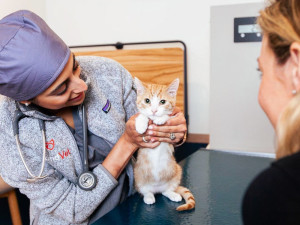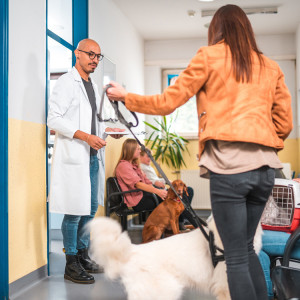Communicating With Your Vet Even Better Than With Your Pet
Is emailing your vet a reasonable expectation?
Your dog can’t write emails, which is definitely a good thing. They would probably all have one of three subject lines: Food, Walk, and Treat. Most dogs get those messages across loud and clear without a dedicated email address. And cats? Cats probably can use email, but they think it’s beneath them.
As a human, email is still a tool you can use on behalf of your pets by making it another path of communication between yourself and a vet. If you’ve never thought to do so, consider how many of us get easy questions answered by our own health practitioners this way with “email my doctor” programs. Kaiser Permanente leads the charge in this regard, and a recent study of thousands of their patients documented that those who communicated via email with their physicians enjoyed better health outcomes. Better health outcomes sound great, so maybe they can be extended to our pets, too. Here are some things to consider before you hit “send.”
Is emailing your vet a reasonable expectation?
You betcha! People who are comfortable communicating with their veterinarians become better medical advocates for their pets. That still doesn’t mean every vet will want to interact with you over the internet.
One surveyopens in new tab of 120 northern California veterinarians revealed that 58 percent communicate with their clients via email. Of those, 62 percent are selective about which clients are given access and 26 percent of those using email set ground rules that describe when and how email is to be used. On the bright side, 95 percent of those using email reported it to be a mostly positive experience. Basically, it never hurts to ask, though you should be respectful of your vet’s boundaries around emailing.
How much do you spend on your pet per year?
When is email a good option for communicating with a vet?
Vets responding to the survey commented on the convenience of email communication. It can be less time-consuming than telephone tag and they like having the option of responding to email at any time of the night or day.
Vets unanimously reported that email is great for simple, non-urgent communications, emphasis on non-urgent. Just imagine every vet’s worst nightmare: an email sent by a client early in the day — but not read until evening — describing a dog who is struggling to breathe. Oh, and by the way, the dog’s gums are blue.
When is email a bad choice for contacting the vet?
Well, the aforementioned breathing issue is one. Any emergency should be attended to in the most speedy way, either with a phone call or an in-office visit.
According to the survey, other common ground rules vets using email generally want their clients to abide by include understanding that email is not to be used like instant messaging. There’s a one to two-day turnaround time for responses. No urgent matters and no “What’s your diagnosis?” questions. Sadly, no “cutesy” emails, like photos or stories that the sender deems to be funny or adorable. They see adorable all day long.
Why do some vets not like email?
Survey responders who aren’t using email reported a variety of reasons for not doing so, including poor word-processing skills, too much time needed to carefully edit their “written words,” inconvenience of transcribing the email communication into the medical record, and concern about clients abusing the system.
Also, face-to-face interactions offer them a lot more information. What is perceived during that type of communication has to do with body language and voice inflection, neither of which can be transmitted in an email. That’s important when a matter is more complex than a simple yes or no question.
If emailing your pet’s doctor appeals to you, ask about it the next time you visit your vet clinic. Anything that enhances communication between you and your vet is bound to be a good thing for your pet, and nothing’s more important than that!








